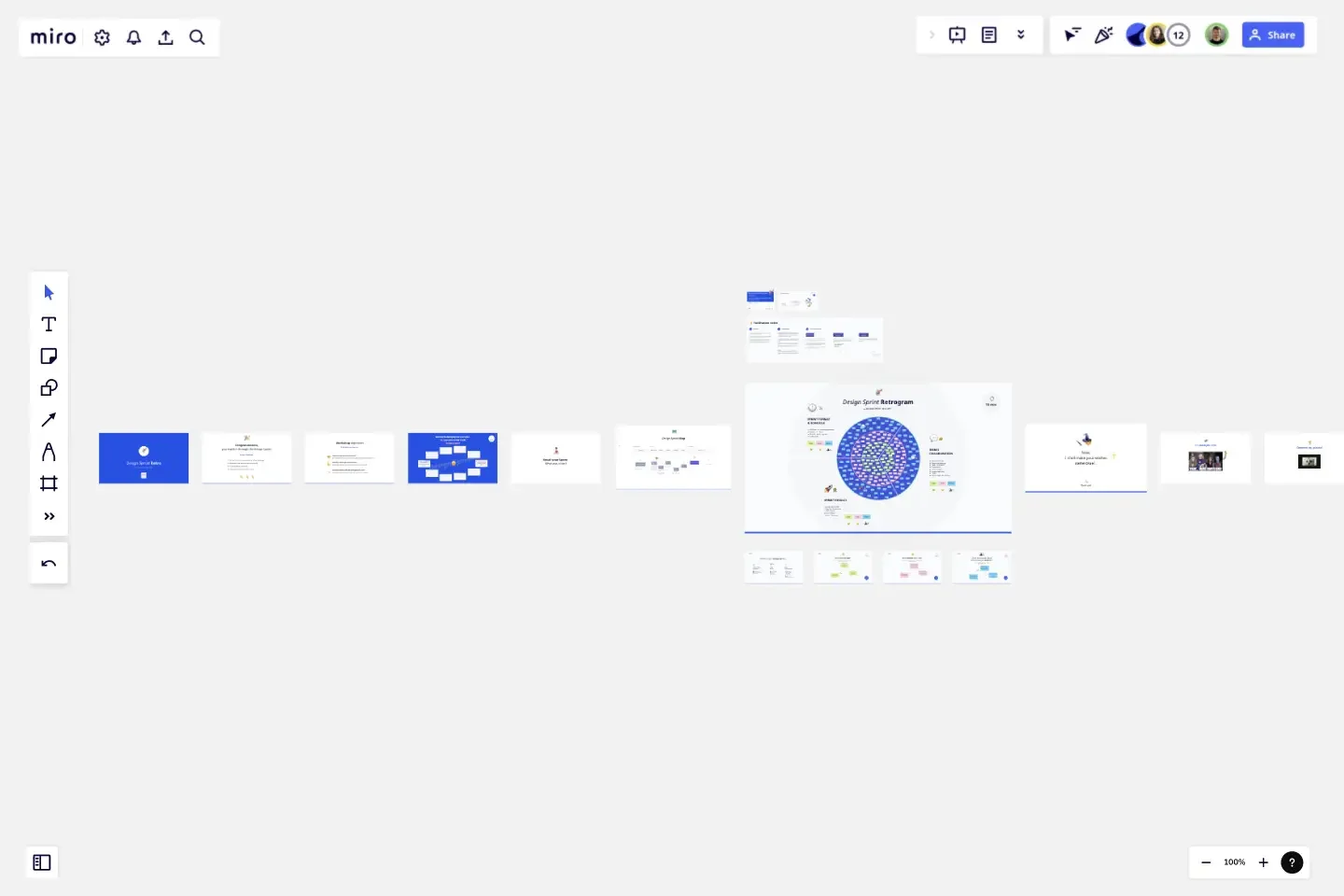Design Sprint Retrogram
A design sprint retrospective is a team meeting focused on improving the design sprint experience and the sprint results.
The design sprint retro (short for retrospective) occurs at the end of each Design Sprint and enables the team to reflect on their sprint experience and share their honest feedback on what went well, what were some challenges, and what should be done better next time.
With our Design Sprint Retrogram Template, facilitators can efficiently highlight opportunities for change and generate meaningful improvements on areas like:
Remote Design Sprint format and schedule (offline vs. online sessions, number of sprint days, daily plan, the team size and structure);
Team collaboration (communication, decision-making, team alignment, engagement, inclusivity, accountability, trust, psychological safety);
Design Sprint Results (the long-term goal, sprint questions, solution sketches, prototype, user testing).
Any Design Sprint Facilitator can use our template to wrap up their design sprints and optimize their next one.
Here's how the 1-hour workshop is structured:
Welcome & congratulate the team for their achievements
Short warm-up
Quick overview of the Design Sprint week
Design Sprint Retrogram overview
Three-step reflection: Highs, Lows, Whishes
Facilitation Notes: If this is your first time doing a design sprint retrospective, we've also included facilitation notes to help you navigate the board. We recommend deleting them before starting the actual workshop.
This template was created by Design Sprint Academy.
Get started with this template right now.
Retrospective - Christmas Edition
Works best for:
Agile Methodology, Retrospectives, Meetings
The Retrospective Christmas Edition template offers a festive and themed approach to retrospectives, perfect for the holiday season. It provides elements for reflecting on the year's achievements, sharing gratitude, and setting intentions for the upcoming year. This template enables teams to celebrate successes, foster camaraderie, and align on goals amidst the holiday spirit. By promoting a joyful and reflective atmosphere, the Retrospective - Christmas Edition empowers teams to strengthen relationships, recharge spirits, and start the new year with renewed energy and focus effectively.
4Ps Retrospective
The 4Ps Retrospective template offers a structured framework for teams to reflect on past iterations or projects using the 4Ps model (Praise, Problems, Possibilities, and Plans). It provides elements for sharing positive feedback, identifying challenges, exploring opportunities, and setting action plans. This template enables teams to conduct retrospectives systematically, generate actionable insights, and drive continuous improvement. By promoting a balanced and comprehensive approach, the 4Ps Retrospective empowers teams to enhance collaboration, boost morale, and achieve their objectives effectively.
5Gs Retrospective
Works best for:
Agile Methodology, Retrospectives, Meetings
The 5Gs Retrospective template offers a structured approach for teams to reflect on their projects or iterations, focusing on five key aspects: Goals, Gains, Gratitude, Gaps, and Growth. It provides elements for identifying achievements, expressing gratitude, and addressing areas for improvement. This template enables teams to conduct retrospectives systematically, fostering a culture of learning, appreciation, and continuous improvement. By emphasizing the five dimensions of reflection, the 5Gs Retrospective empowers teams to optimize their performance, enhance collaboration, and achieve their goals effectively.
Feature Planning Template
Works best for:
Desk Research, Agile Methodology, Product Management
Features are what make a product or service fun, but adding new ones is no walk in the park. It takes many steps—ideating, designing, refining, building, testing, launching, and promoting—and just as many stakeholders. Feature Planning lets you put a smooth, sturdy process in place, so you can add a feature successfully, and spend less time and resources doing it. That makes our Feature Planning Template a smart starting point for anyone looking to add new product features, especially members of product, engineering, marketing, and sales teams.
Year in Review Template
Works best for:
Retrospectives
The Year in Review Template encapsulates an entire year's pivotal moments, achievements, and challenges. One of its standout benefits is its ability to foster deep introspection. With this template, people or teams can genuinely reflect on their experiences, ensuring that every lesson learned and every milestone achieved is recognized and used for future growth.
PI Planning Template
Works best for:
PI Planning, Product Management
The Miro PI Planning Template streamlines the Program Increment planning process for Agile teams. It facilitates a collaborative environment, enabling teams to efficiently align on strategies, identify dependencies, and convert decisions into actionable tasks. With features like real-time collaboration, Jira integration, and a centralized workspace, the template supports teams in enhancing efficiency, engagement, and decision-making.
